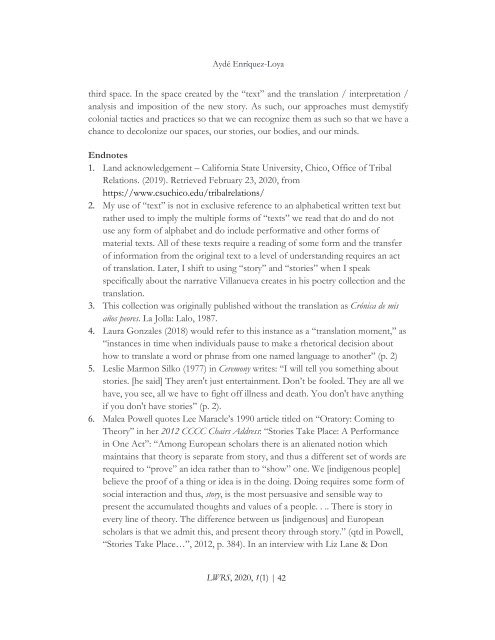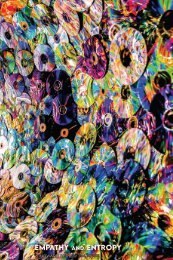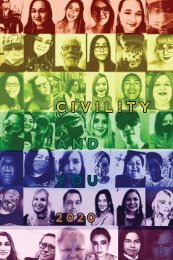LWRS June 2020 Volume 1, Issue 1
Inaugural Issue co-edited by Yndalecio Isaac Hinojosa and Isabel Baca
Inaugural Issue co-edited by Yndalecio Isaac Hinojosa and Isabel Baca
Create successful ePaper yourself
Turn your PDF publications into a flip-book with our unique Google optimized e-Paper software.
Aydé Enríquez-Loya<br />
third space. In the space created by the “text” and the translation / interpretation /<br />
analysis and imposition of the new story. As such, our approaches must demystify<br />
colonial tactics and practices so that we can recognize them as such so that we have a<br />
chance to decolonize our spaces, our stories, our bodies, and our minds.<br />
Endnotes<br />
1. Land acknowledgement – California State University, Chico, Office of Tribal<br />
Relations. (2019). Retrieved February 23, <strong>2020</strong>, from<br />
https://www.csuchico.edu/tribalrelations/<br />
2. My use of “text” is not in exclusive reference to an alphabetical written text but<br />
rather used to imply the multiple forms of “texts” we read that do and do not<br />
use any form of alphabet and do include performative and other forms of<br />
material texts. All of these texts require a reading of some form and the transfer<br />
of information from the original text to a level of understanding requires an act<br />
of translation. Later, I shift to using “story” and “stories” when I speak<br />
specifically about the narrative Villanueva creates in his poetry collection and the<br />
translation.<br />
3. This collection was originally published without the translation as Crónica de mis<br />
años peores. La Jolla: Lalo, 1987.<br />
4. Laura Gonzales (2018) would refer to this instance as a “translation moment,” as<br />
“instances in time when individuals pause to make a rhetorical decision about<br />
how to translate a word or phrase from one named language to another” (p. 2)<br />
5. Leslie Marmon Silko (1977) in Ceremony writes: “I will tell you something about<br />
stories. [he said] They aren't just entertainment. Don’t be fooled. They are all we<br />
have, you see, all we have to fight off illness and death. You don't have anything<br />
if you don't have stories” (p. 2).<br />
6. Malea Powell quotes Lee Maracle’s 1990 article titled on “Oratory: Coming to<br />
Theory” in her 2012 CCCC Chairs Address: “Stories Take Place: A Performance<br />
in One Act”: “Among European scholars there is an alienated notion which<br />
maintains that theory is separate from story, and thus a different set of words are<br />
required to “prove” an idea rather than to “show” one. We [indigenous people]<br />
believe the proof of a thing or idea is in the doing. Doing requires some form of<br />
social interaction and thus, story, is the most persuasive and sensible way to<br />
present the accumulated thoughts and values of a people. . .. There is story in<br />
every line of theory. The difference between us [indigenous] and European<br />
scholars is that we admit this, and present theory through story.” (qtd in Powell,<br />
“Stories Take Place…”, 2012, p. 384). In an interview with Liz Lane & Don<br />
<strong>LWRS</strong>, <strong>2020</strong>, 1(1) | 42





